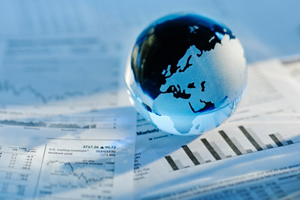 Europe, Middle East and Africa
Europe, Middle East and Africa
The German economy continues to struggle, most recently with news reports that its financial state has not grown in the past few months, according to The Guardian. “Germany’s economy flatlined in the last three months of 2019 after a slowdown in spending, and exports wiped out growth in Europe’s largest economy,” as noted by the news publication.
Additionally, the country’s Gross Domestic Product (GDP) was found to have stagnated at a dismal growth rate of 0% in the fourth quarter of 2019. This came as a result of a slew of issues, including trade tensions, auto industry changes and a poor European economic outlook in general, according to The Guardian.
In an interview with the newspaper, Joshua Mahony, a senior market analyst, said: “The German economy has gone from being the bastion of eurozone growth to perhaps the greatest hindrance, with the industrial powerhouse continuing to suffer under the wrath of Donald Trump’s combative approach to global trade.”
Notably, it’s quite likely that Germany’s economy will continue to see slow growth, especially with news of the coronavirus affecting global markets. “Government officials said the economy ‘remains in a weak phase,’ following ‘very weak’ industrial production and a drop in incoming orders for manufacturing firms towards the end of the year,” according to the publication.
Asia-Pacific
The Japanese economy’s outlook just got some of its worst news in years, according to a new report by Bloomberg News. “Japan’s economy likely suffered its biggest contraction since 2014 at the end of last year leaving it in a vulnerable state, as fallout from China’s viral outbreak threatens to turn a one-quarter-slump into a recession,” according to the publication.
The issue centers on the following: “A sharp drop in consumer spending after a sales tax hike is seen as the main culprit behind an annualized 3.8% contraction estimated by economists. The slide would be the worst for Japan since the second quarter of 2014, when a previous tax increase prompted the economy to shrink by 7.4%,” according to Bloomberg.
“Japan’s underlying economy isn’t on a firm footing to start with, so growth can be easily pushed into a negative territory if something like the coronavirus happens,” said Hiroshi Miyazaki, an economist at Mitsubishi UFJ Morgan Securities, in an interview with Bloomberg.
The poor news comes after Japan’s Prime Minister Shinzo Abe took the step in December to provide the economy with a stimulus package in order to help support growth.
Americas
The United States has seen more positive economic news in recent days – the most recent being the highest consumer sentiment figures since March of 2019, according to CNBC. This, notably, comes despite the growing concerns over the coronavirus that has claimed the lives of over 1,000 people.
“The University of Michigan’s consumer sentiment index came in at 100.9 for February. Economists polled by Dow Jones expected February consumer sentiment to come in at 99.5,” according to the news publication.
“Current personal finances as well as evaluations of the national economy each posted large gains,” said Richard Curtin, chief economist for the Surveys of Consumers, in a statement to CNBC. “Net gains in household income and wealth were reported more frequently in early February than at any prior time since 1960.”

Connect with MRINetwork